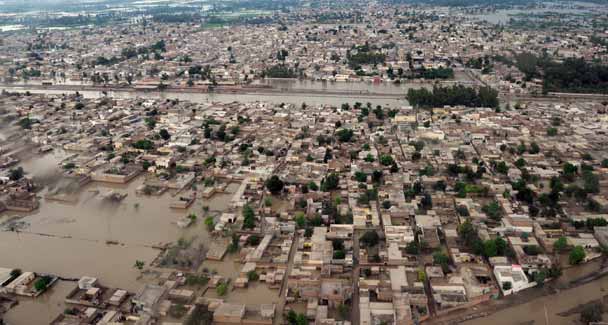Torrential rains continued to pour down on Pakistan, worsening an already catastrophic situation, according to Dawn.
The Indus river, which runs down the middle of Pakistan from top to bottom, almost for the entire length of the country, has been overflowing its banks, submerging villages for miles on either side. The powerful, gushing streams of water have been breaking dykes, killing thousands of people, and forcing several million to people to flee their homes and seek shelter elsewhere.

Prime Minister Yousuf Raza Gilani has appealed to the international community for help with the floods, saying, “The loss of human lives and infrastructure is colossal. … . I would take this opportunity to appeal to the overseas Pakistanis to extend support to their countrymen in coping with the losses and sufferings.”
Meanwhile, where’s Pakistan’s President Asif Ali Zardari?? Why isn’t he at home comforting the flood victims? Because he’s spent the week in France and Britain, trying to convince everyone that Pakistan is fighting the good fight against terrorism, and so they should keep providing aid money. The result is a growing scandal, and worsening of his already low popularity ratings. In Britain on Saturday, giving a campaign speech to the Pakistan diaspora, crowds heckled him and a protestor threw shoes at him, according to the Telegraph, reminiscent of a similar incident involving President George Bush in Iraq.

There are 500 fires burning across Russia, about 50 of them on the outskirts of Moscow. Muscovites are warned to stay indoors because of the heavy smog, and if they do go outdoors, they choke on the smog and can’t see more than a few feet in front of them.
A severe drought has destroyed one-fifth of Russia’s wheat, and now wildfires are finishing off some of the fields that remained, as seen in the above picture from the Moscow Times.
In order to prevent sharp price increases for food in Russia, Prime Minister Vladimir Putin has frozen all wheat exports until at least the end of the year. In addition, Moscow has requested that former Soviet states Kazakhstan and Belarus also freeze their wheat exports, according to Ria Novosti.
Russia is the world’s third largest exporter of wheat, so the freeze has led to wheat price surges on world commodity exchanges. This could have enormous effects in poor or underdeveloped regions around the world.
But it’s also having an effect on internal politics. Russians are furious at Moscow for being so poorly prepared for this wildfire epidemic, according to Spiegel.
But it goes beyond just feelings of frustration. In 2007, Putin dismantled Russia’s forestry service, replacing it with a high-tech system based on satellites. Unfortunately, the new high-tech system is incapable of detecting small fires, according to a summary of analyses by Russian experts published by Eurasia Review. One normally doesn’t fire firemen during a fire, but things are so bad that BBC reports that President Dmitry Medvedev is sacking top military officers over Russia fire failures.
From the point of view of Generational Dynamics, we look at disasters like the ones in Pakistan and Russia as having the potential for triggering major changes in generational attitudes and behaviors. The most likely effect of such changes is to push the country faster along the generational trend time line.
We’ve already seen how the Katrina disaster negatively affected President George Bush’s approval ratings, and how the Gulf oil disaster negatively affected President Barack Obama’s approval ratings. In fact, the last word may not yet have been spoken on the effects of those two disasters, since both of them affected the New Orleans region, creating a sub-population that’s absolutely furious at the incompetence of the federal government.
The consequences of the disasters on Pakistan and Russia have hardly begun. Both Russia and Pakistan are in generational crisis eras, meaning that we can expect crisis era behaviors to become more evident. In Russia, this means more xenophobia and inter-ethnic violence. In Pakistan, this means more suicide bombers and more inter-religious violence. In both cases, it will probably mean an increase in nationalism, and fast-rising impatience with politicians who don’t perform as hoped — as is happening in America as well.
COMMENTS
Please let us know if you're having issues with commenting.